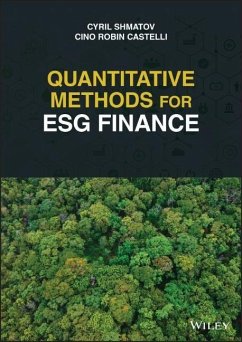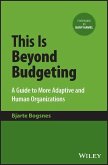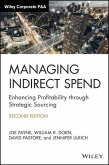A quantitative analyst's introduction to the theory and practice of ESG finance
In Quantitative Methods for ESG Finance, accomplished risk and ESG experts Dr. Cyril Shmatov and Cino Robin Castelli deliver an incisive and essential introduction to the quantitative basis of ESG finance from a quantitative analyst's perspective. The book combines the theoretical and mathematical bases underlying risk factor investing and risk management with accessible discussions of ESG applications.
The authors explore the increasing availability of non-traditional data sources for quantitative analysts and describe the quantitative/statistical techniques they'll need to make practical use of these data. The book also offers:
_ A particular emphasis on climate change and climate risks, both due to its increasing general importance and accelerating regulatory change in the space
_ Practical code examples in a Python Jupyter notebook that use publicly available data to demonstrate the techniques discussed in the book
_ Expansive discussions of risk factor investing, portfolio construction, ESG scoring, new ESG-driven financial products, and new financial risk management applications, particularly those making use of the proliferation of "alternative data", both text and images
A must-read guide for quantitative analysts, investment managers, financial risk managers, investment bankers, and other finance professionals with an interest in ESG-driven investing, Quantitative Methods for ESG Finance will also earn a place on the bookshelves of graduate students of business and finance.
Hinweis: Dieser Artikel kann nur an eine deutsche Lieferadresse ausgeliefert werden.
In Quantitative Methods for ESG Finance, accomplished risk and ESG experts Dr. Cyril Shmatov and Cino Robin Castelli deliver an incisive and essential introduction to the quantitative basis of ESG finance from a quantitative analyst's perspective. The book combines the theoretical and mathematical bases underlying risk factor investing and risk management with accessible discussions of ESG applications.
The authors explore the increasing availability of non-traditional data sources for quantitative analysts and describe the quantitative/statistical techniques they'll need to make practical use of these data. The book also offers:
_ A particular emphasis on climate change and climate risks, both due to its increasing general importance and accelerating regulatory change in the space
_ Practical code examples in a Python Jupyter notebook that use publicly available data to demonstrate the techniques discussed in the book
_ Expansive discussions of risk factor investing, portfolio construction, ESG scoring, new ESG-driven financial products, and new financial risk management applications, particularly those making use of the proliferation of "alternative data", both text and images
A must-read guide for quantitative analysts, investment managers, financial risk managers, investment bankers, and other finance professionals with an interest in ESG-driven investing, Quantitative Methods for ESG Finance will also earn a place on the bookshelves of graduate students of business and finance.
Hinweis: Dieser Artikel kann nur an eine deutsche Lieferadresse ausgeliefert werden.








